Are you looking for the best laptop for cyber security? It’s perfect for professionals, students, or enthusiasts involved in or interested in cybersecurity-related tasks like network security analysis, penetration testing, ethical hacking, and digital forensics.
Table of Contents
Cybersecurity professionals and students require powerful laptops to protect themselves against cyber attacks and run security software. Regular consumer laptops are often overlooked, but they possess the necessary capabilities required for cybersecurity.
One of the most important characteristics that must be included in a cybersecurity machine is extensive storage space, in addition to a strong CPU and integrated security capabilities. All of them, however, are only the fundamentals.
The following information will provide readers with insights into the features that make a laptop ideal for professional cybersecurity work, as well as for students acquiring essential skills.
Additionally, for those interested in furthering their education in cybersecurity, explore our article on the 12 Best Cybersecurity Scholarships To Apply In 2024. Ready to discover opportunities for cybersecurity scholarships?
Key Takeaways
- Strong processor and enough memory (RAM) are important for cybersecurity laptops
- Consider a laptop with at least 16 GB of RAM
- More RAM is better for running multiple programs at the same time
- Cybersecurity professionals use laptops to test computer systems for weaknesses
- They also use laptops to analyze data and run antivirus software
- Some important features for cybersecurity laptops are long battery life and a good cooling system
- A good cooling system is important because laptops can get hot when running security software
- There are laptops available for all budgets
- Even a basic laptop can be useful for learning cybersecurity skills
List of Top 10 Best Laptop for Cyber Security
Here is a list of the 10 best laptops for students and professionals in the field of cybersecurity, along with buying advice that will aid you in picking the cybersecurity laptop that is best suited to meet your specific requirements.
| Laptop | Best For | Processor | RAM | Storage | Pros | Cons |
| MacBook Air M2 | Top Choice, Power Users | Apple M2 chip | 8GB | 256GB SSD | Powerful chip, Long battery life, Quiet, Secure | Less efficient screen/GPU, Limited display support, Lower RAM |
| Lenovo ThinkPad X1 Extreme Gen 5 | Best Battery Life | 12th Gen Intel Core i7 | Up to 64GB | Up to 8TB SSD | High RAM, Security features, Low blue light | Limited battery life, Lower speaker/webcam quality |
| ASUS ZenBook Flip 13 | Best Security Features | 11th Gen Intel Core i5 | 8GB | 512GB SSD | Facial recognition, Security features, Compact | Touchpad issues |
| Dell XPS 13 9310 | Best for Students | 11th Gen Intel Core i5/i7 | 8GB or 16GB | 256GB, 512GB, or 1TB SSD | Security Suite, Facial recognition (optional) | Limited fingerprint reader options |
| Alienware M15 R6 | Best Investment | 11th Gen Intel Core i7 | 16GB | 1TB SSD | Powerful specs, Great design | Less efficient screen/GPU |
| Acer Aspire 5 | Budget Friendly | 11th Gen Intel Core i5 | 8GB | 512GB SSD | Budget friendly, Expandability | Lower battery life, Keyboard issues |
| Acer Predator Helios 300 | Long-term Operations | Intel Core i7-11800H | 16GB | 512GB SSD | Efficient cooling, Versatile | Limited battery life, Lower Windows 10 Home security features |
| LG Gram 17Z90P | Budget Friendly | Intel Core i5 | 16GB | 512GB SSD | Large screen, Long battery life | No built-in antivirus, Lower RAM |
| HP 15 Laptop | Lightweight | Intel Core i5 9220 | 16GB | 512GB HDD | High RAM, Storage, Sturdy build | Lower battery life |
| HP Newest 17 Laptop Notebook | Budget Friendly | AMD Ryzen 5 5625U | 4GB | 128GB SSD | Budget friendly, Large display | Limited ports, Heavy |
1. MacBook Air M2 (Best Laptop for Cyber Security Course and Career)
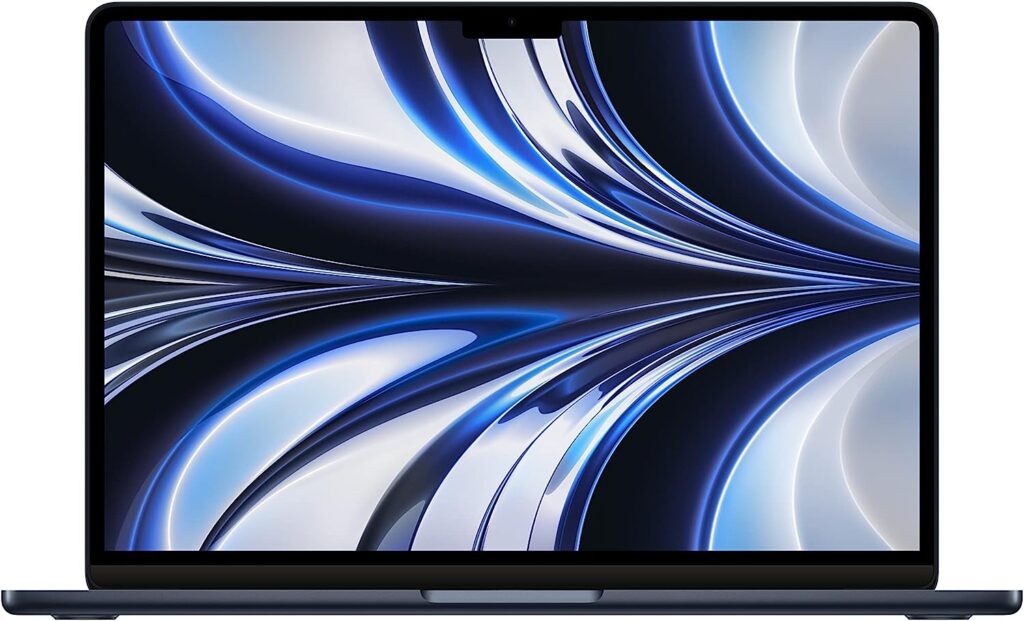
The MacBook Air with M2 chip stands out as a sleek and powerful laptop, available in four elegant finishes: Silver, Starlight, Space Gray, and Midnight. Regarded as one of the top choices for cybersecurity students and professionals, the MacBook Air M2 offers impressive performance. As of 2024, the price for the MacBook Air M2 with 8GB RAM and 256GB SSD is $1,299.
Specifications:
- Touch ID
- Apple M2 chip
- Up to 18 hours of battery life
- 8-core CPU
- Up to 10-core GPU
- 13.6-inch Liquid Retina display
Pros:
- Powerful M2 chip: The MacBook Air M2 is powered by the advanced M2 chip, providing robust performance for various tasks.
- Long battery life (up to 18 hours): Users can enjoy extended usage without frequent charging, enhancing productivity.
- Runs completely silently due to its fanless design: The fanless design ensures quiet operation, making it ideal for environments where noise is a concern.
- MacOS is one of the best laptops immune to external cyber vulnerabilities like malware and various other affecting elements: macOS offers enhanced security features, protecting users from external cyber threats effectively.
Cons:
- Less efficient screen and GPU compared to some other laptops for cybersecurity: While the MacBook Air M2 offers a high-quality display, it may not match the efficiency and performance of some competing laptops in terms of screen and GPU capabilities.
- Supports only one external display: Users may find the limitation of supporting only one external display restrictive for multitasking or professional purposes.
- Less memory (8 GB) compared to some other laptops for cybersecurity: The MacBook Air M2’s 8GB RAM may be insufficient for demanding cybersecurity tasks, potentially leading to performance limitations.
How does this laptop help cybersecurity experts?
Cybersecurity experts need laptops for many tasks. Laptops have the computing power to run advanced cybersecurity software and tools. Penetration testing frameworks, network analysis utilities, and encryption algorithms are essential for detecting vulnerabilities, analyzing network traffic, and securing sensitive data. Cybersecurity experts can assess systems and networks with laptops, finding vulnerabilities and implementing strong security measures.
2. Lenovo ThinkPad X1 Extreme Gen 5 (Best Battery Cyber Security Laptop)
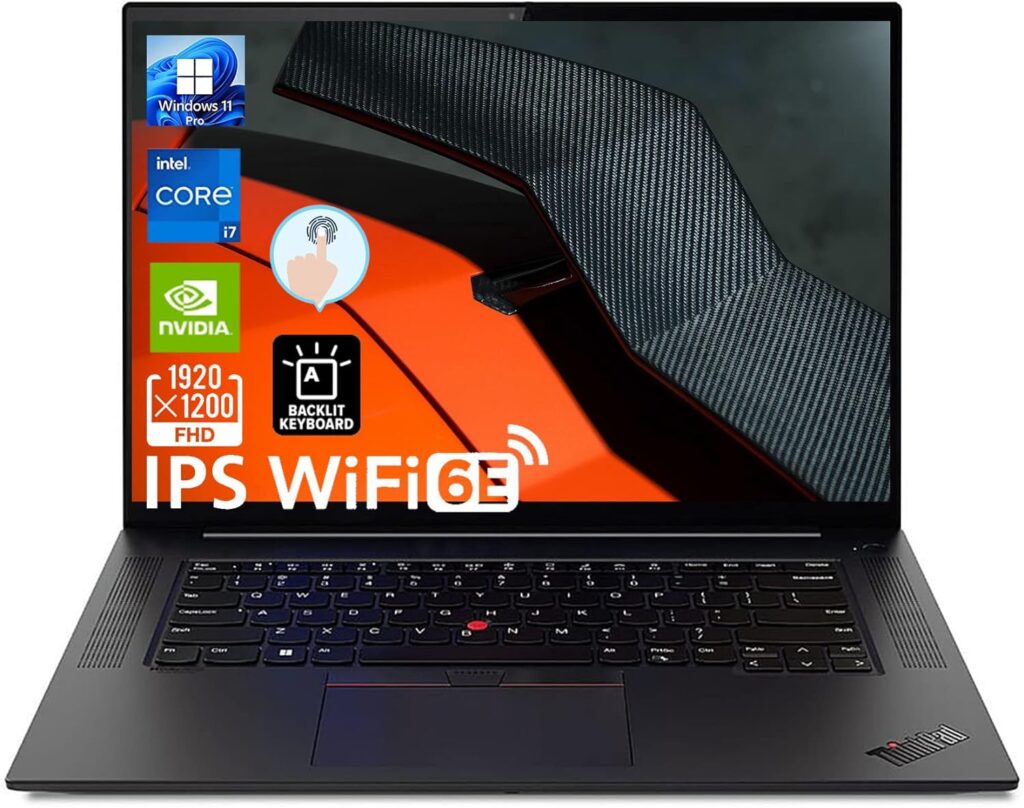
The Lenovo ThinkPad X1 Extreme Gen 5 (16” Intel) Laptop is widely acclaimed for its durability and exceptional performance, making it a top pick for handling cybersecurity tasks with ease.
With the capability to accommodate up to 65 GB of RAM, it effortlessly handles multiple programs simultaneously. The laptop features Tile-enabled security, enabling users to track it via smartphone even when powered down. Additionally, its low blue light panels reduce eye strain, which is particularly beneficial for cybersecurity professionals spending long hours in front of screens.
Customers praise its speed, quiet operation, and impressive battery life. However, some express dissatisfaction with the quality of the speakers and the webcam, although these aspects might not be primary concerns for cybersecurity professionals.
Specifications:
- Battery life: Approximately five hours
- Processor: 12th Generation Intel Core i7-12700H Processor
- Operating system: Windows 11
- RAM: Up to 64 GB DDR5 4800MHz, dual
- Storage capacity: Up to 8 TB SSD storage
- Security features: Tile-enabled, fingerprint reader
Pros:
- High RAM capacity: With the ability to support up to 64 GB of DDR5 RAM, the laptop excels in multitasking and handling resource-intensive cybersecurity applications.
- Security features: The inclusion of Tile-enabled tracking and a fingerprint reader enhances the laptop’s security, providing peace of mind to users concerned about data protection.
- Low blue light panels: The screen’s low blue light panels reduce eye strain during extended usage, contributing to user comfort and productivity.
Cons:
- Limited battery life: The laptop’s battery life, rated at approximately five hours, may be insufficient for users who require extended periods of uninterrupted usage.
- Speaker and webcam quality: While functional, the speakers and webcam may not meet the expectations of users who prioritize audiovisual quality in their computing experience.
How does this laptop help cybersecurity professionals?
Laptops keep cybersecurity professionals connected and informed in real-time. To stay current on industry threats, trends, and best practices, they can use cybersecurity forums, online communities, and educational resources. Laptops help cybersecurity experts collaborate and share knowledge during training and collaboration.
3. ASUS ZenBook Flip 13 (Best Laptop with Robust Security Features)
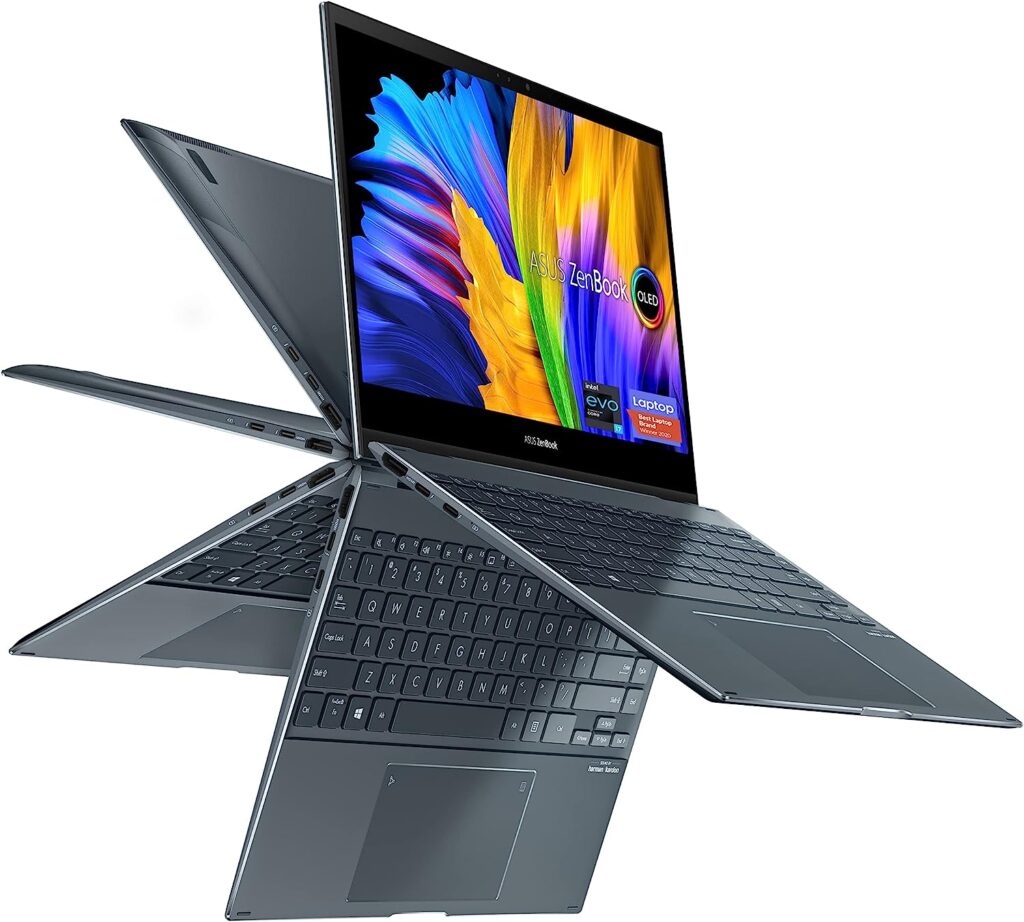
The ASUS ZenBook Flip 13 stands out as a premium laptop offering a sleek design and versatile functionality. Engineered with a 360° ErgoLift hinge display, it ensures maximum portability and compactness. Particularly lauded as one of the top choices for IT professionals, the ASUS ZenBook Flip 13 UX363EA-HP296R Laptop is priced at $1,199.
Specifications:
- Processor: 11th Gen, Intel® Evo™ Platform Core™ i5-1135G7 Processor 2.4 GHz (8M Cache, up to 4.2 GHz Turbo Boost, 4 cores)
- Memory: 8GB
- Storage: 512GB M.2 NVMe™ PCIe® 3.0 SSD
- Graphics: Intel® Iris Xe Graphics
- Display: 13.3-inch Touch screen (1920 x 1080) Glossy Display, 16:9 aspect ratio, 550nits peak brightness
Pros:
- The ASUS ZenBook Flip 13 Notebook integrates a front infrared camera that swiftly recognizes your face, enabling seamless logins through Windows Hello.
- This slim, adaptable, ultra-compact 13-inch convertible boasts an exceptional OLED display, enhancing user experience.
- Advanced encryption features are embedded to safeguard user data, along with the capability for remote wipes in instances of device theft or loss.
Cons:
- The touchpad is susceptible to mistouches, potentially impacting user experience.
How does this laptop help cybersecurity experts?
Cybersecurity experts use this laptop for their mobility, processing power, and adaptability to protect digital systems. They conduct vulnerability assessments, penetration testing, and forensic analyses on laptops for security agility. Cyber threats are identified, mitigated, and responded to using specialized software and scripts.
Laptops are hubs for tracking emerging threats, cybersecurity trends, and real-time collaboration. Laptops give cybersecurity experts the tools to defend digital infrastructures in a changing threat landscape.
4. Dell XPS 13 9310 (Best Laptop for Cyber Security Students)
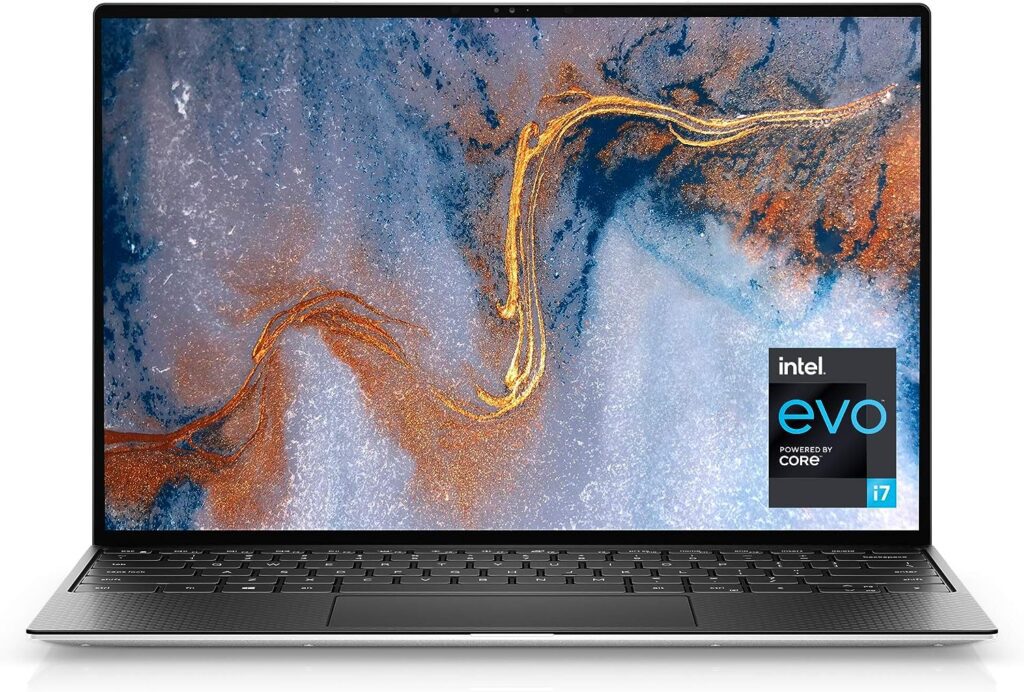
Dell XPS 13 9310 is a premium laptop that made its debut in October 2020, featuring a starting price of $1,402 for the Core i5 variant with 8 GB RAM and 512 GB SSD, and going up to $2,396 for the Core i7 version with 16 GB RAM.
Specifications:
- Processor: 11th Generation Intel Core i5-1135G7 or Core i7-1185G7
- Display: 13.4-inch UHD+ (3840 x 2400 pixels) or FHD+ (1920 x 1200 pixels)
- Memory: 8 GB or 16 GB DDR4 RAM
- Storage: 256 GB, 512 GB, or 1 TB SSD
- Graphics: Intel Iris Xe
- Operating System: Windows 10 Home Edition
- Battery: 52Whr
- Connectivity: Wi-Fi 802.11 axe
Pros:
- The Dell XPS 13 versions come with a Security Suite Enterprise, offering users software-based solutions to enhance system security against potential threats such as hackers and malware.
- High-end Dell XPS models feature facial recognition, bolstering the device’s security features.
Cons:
- The laptop offers optional fingerprint readers and supports Windows Hello for fingerprint sign-in exclusively.
How does this laptop help cybersecurity students?
They give students virtual environments to use network scanners and penetration testing frameworks. Learning by doing with these tools is crucial to preparing for real-world internet threats. Laptops also let students use educational platforms and cybersecurity forums to learn about emerging risks and how to defend themselves.
Collaborative forums bring professionals and peers from around the world together, making learning lively. Laptops allow students to work remotely on cybersecurity projects, helping them adapt to industry changes.
5. Alienware M15 R6 (Best Investment Laptop for Cyber Security Professionals)
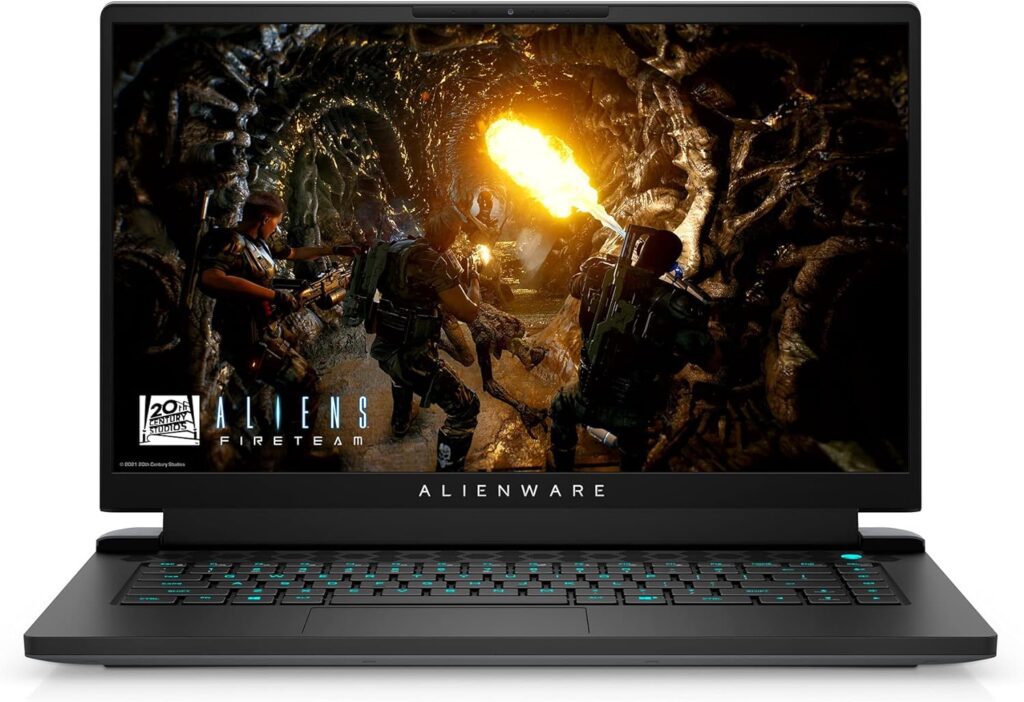
The Alienware M15 R6, a gaming laptop, was introduced to the market in May 2021. As of 2024, the price of the Dell Alienware M15 R6 laptop in the USA starts at $1,599.
Specifications:
- Display: 15.6-inch (1920 x 1080) or QHD (2560 x 1440) resolution
- Processor: 11th Gen Intel Core i7-11800H
- Graphics: NVIDIA GeForce RTX 3070 (Laptop)
- Memory: 16GB DDR4 RAM
- Storage: 1TB SSD
- Connectivity: Wi-Fi 6, Bluetooth 5.2, Thunderbolt 4, HDMI 2.1, Mini-DisplayPort 1.4
- Operating System: Windows 10 Home
Pros:
- The Alienware M15 R6 boasts powerful features suitable for intense tasks, including gaming and cybersecurity.
- Its design is well-crafted, powerful, and offers great battery life.
- The laptop is packed with features ideal for cybersecurity purposes.
- It serves as the Intel-powered counterpart to the Ryzen m15 R5, offering non-identical specifications.
Cons:
- The screen and GPU may be less efficient compared to other models in its category.
How does it help cybersecurity professionals?
Cybersecurity experts need this laptop for portability, computing power, and flexibility. Laptops help these professionals perform vulnerability assessments, penetration testing, and forensic examinations quickly and adapt to new threats. They detect, mitigate, and counter cyberattacks using specialized software and scripts.
Laptops also serve as knowledge hubs, allowing researchers to track evolving threats, stay current on cybersecurity trends, and collaborate seamlessly. Laptops are essential for cybersecurity professionals to protect digital domains.
6. Acer Aspire 5
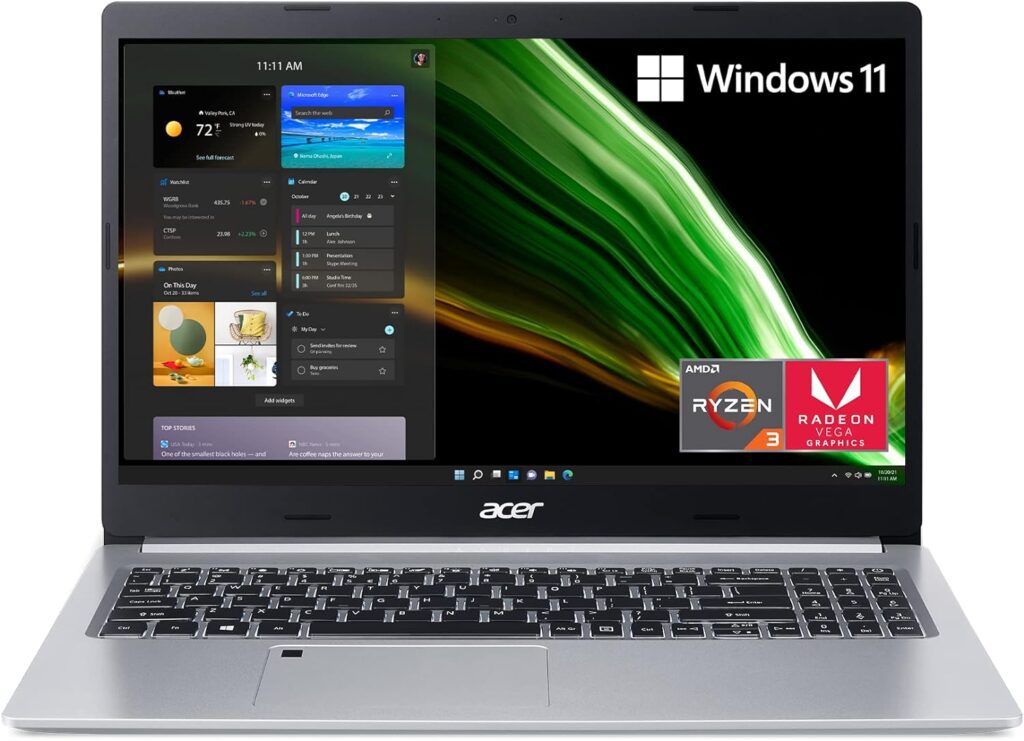
The Acer Aspire 5 boasts the latest 13th Gen Intel Core Processors and NVIDIA GeForce RTX graphics. As of May 2023, the Acer Aspire 5 (A515-56-5) laptop is priced at $700 in the USA.
Specifications:
- Display: 15.6-inch with a resolution of 1920×1080 pixels
- Operating System: Windows 11
- Processor: 11th Gen Intel Core i5
- RAM: 8GB
- Storage: 512GB SSD
- Connectivity: Wi-Fi 802.11 a/b/g/n/ac/axe, Bluetooth, Ethernet
Pros:
- Sturdy build quality
- Extensive selection of ports
- Reliable productivity performance
- Varied port selection catering to diverse needs
- Impressive expandability options
- Swift NVMe SSD for rapid data access
Cons:
- The touchpad may feel stiff and less responsive
- Battery life falls below average
- The keyboard lacks precision and feels loose
- Absence of Windows Hello support for enhanced security features
- Performance degradation is noticeable during CPU-intensive creative tasks
- Limited graphics capability for gaming or demanding creative workloads
How does it help experts?
To protect digital ecosystems, cybersecurity experts use laptops’ portability, processing power, and ability to do many things at once. With laptops in hand, these professionals do important tasks like vulnerability assessments, penetration testing, and forensic scrutiny, which lets them deal with security problems as they come up.
They find, stop, and respond to cyber threats accurately with the help of specialized software tools and scripts. Laptops also make it easier to keep learning, so experts can keep an eye on how threats are changing, learn about new developments in cybersecurity, and work together with their peers in real-time.
So, laptops are very important tools for cybersecurity experts because they help protect digital infrastructures in a threat environment that is always changing.
7. Acer Predator Helios 300 (Best for long-term operations of cybersecurity)
The Acer Predator Helios, primarily designed as a gaming laptop, serves admirably for cybersecurity use, especially for students. It presents a compelling alternative compared to ASUS laptops or similar models, offering affordability without compromising on quality graphics or swift functionality. Despite being an older model, it remains a dependable choice.
Specifications:
- Battery life: Up to four hours
- Processor: Intel Core i7-11800H
- Operating system: Windows 10 Home
- RAM: 16 GB
- Storage capacity: 512 GB
- Security features: Firmware Trusted Platform Module solution, lock slot, BIOS passwords
Pros:
- Efficient Cooling: The Acer Predator Helios features quick and efficient cooling mechanisms, crucial for both gamers and technicians, ensuring optimal performance during prolonged use.
- Versatility: Buyers commend its suitability for anyone requiring a powerful system, whether for handling large quantities of sensitive data, running antivirus software, or engaging in system penetration testing.
Cons:
- Limited Battery Life: With a battery life of up to four hours, the Acer Predator Helios may fall short for users needing extended periods of mobile operation without access to power outlets.
- Windows 10 Home: While functional, Windows 10 Home may lack certain advanced security features available in higher-tier editions, potentially impacting cybersecurity operations that require enhanced system control.
How does it help in cybersecurity operations?
Professionals in cybersecurity depend on laptops because they give them the tools and mobility they need to deal with a wide range of security issues. To begin, laptops let cybersecurity experts check for weaknesses and do penetration tests on different networks and systems. These tests help organizations find possible weak spots and entry points for cyber threats, so they can proactively make their defenses stronger.
8. LG Gram 17Z90P (Best Budget Laptops for Cyber Security)
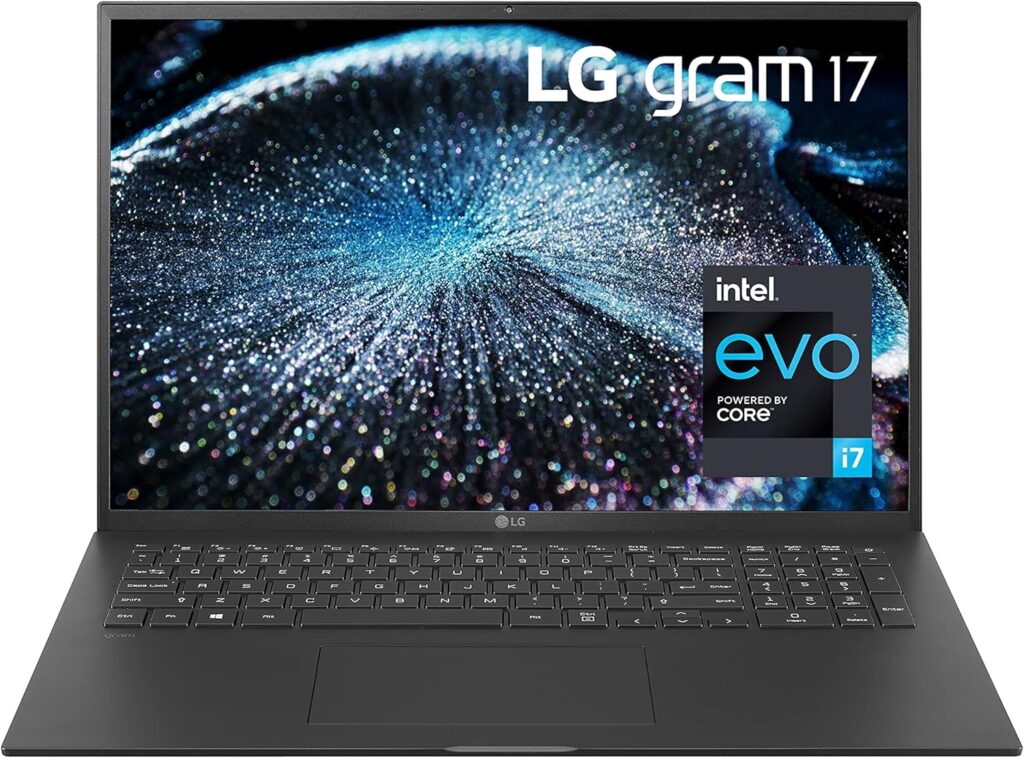
The LG Gram 17Z90P stands out as a slim and lightweight laptop option, featuring an Intel Core i7-1165G7 processor, 16 GB RAM, and 512 GB SSD storage, priced at approximately $1,250.
Specifications:
- Processor: Intel Core i5
- RAM: 16 GB LPDDR4
- Hard Disk: 512 GB SSD
- Operating System: Windows 10 Home (64-bit)
- Resolution: 2560 x 1600 pixels
- Battery Backup: Up to 19 hours
Pros:
- The LG Gram 17Z90P boasts a spacious 17-inch screen, facilitating efficient multitasking by accommodating multiple windows or applications simultaneously.
- With an impressive battery life of up to 19.5 hours, users can rely on extended usage durations, making it suitable for remote work scenarios or situations where access to power outlets is limited.
- Equipped with Intel Xe Graphics, the laptop delivers smooth performance for multitasking and multimedia tasks.
Cons:
- The LG Gram 17Z90P lacks a built-in antivirus program, necessitating users to separately install one for protection against cyber threats.
- Compared to other laptops, the LG Gram 17Z90P offers a relatively modest amount of RAM, featuring only 16 GB of memory.
How does this budget laptop help cybersecurity professionals?
Security professionals with limited resources need budget laptops for accessibility and functionality. Cheap laptops have cybersecurity-friendly features. These laptops allow basic vulnerability assessments, penetration testing, and system and network security audits.
Budget laptops can run security software, analyze logs, and manage security configurations despite their lower specifications. Budget laptops also help aspiring cybersecurity professionals learn and practice essential security practices.
9. HP 15 Laptop (Best Lightweight Laptop for Cyber Security)
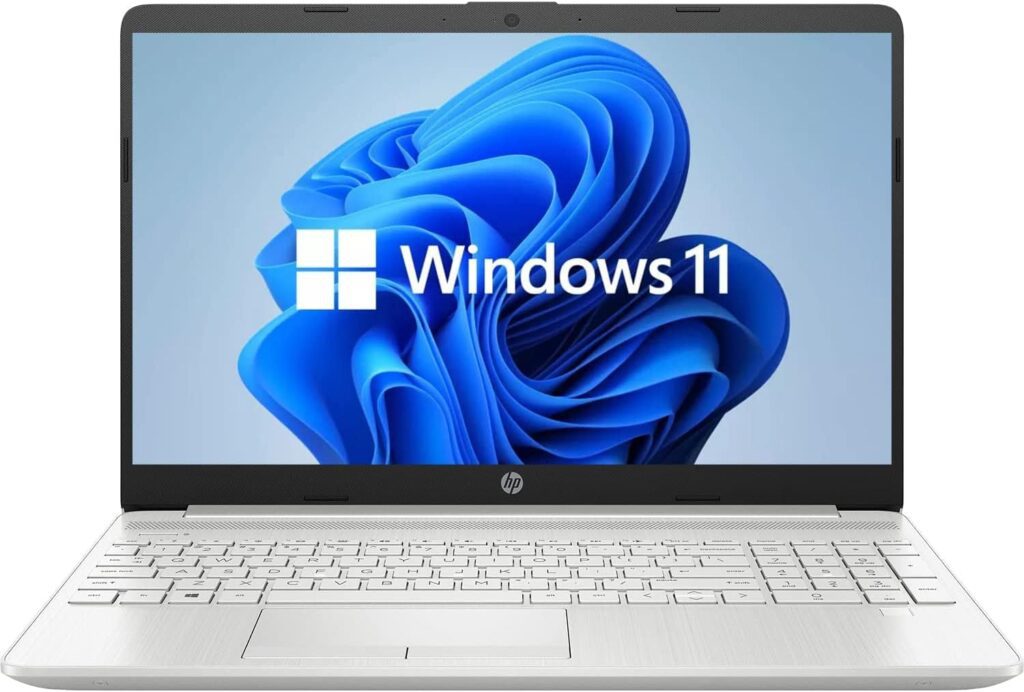
The HP 15 Laptop offers a variety of configurations, each tailored to specific needs and budgets. As of 2024, in the USA, the starting price for the HP 15 laptop is $849.
Specifications:
- Display: 15.6-inch with a resolution of 1366×768 pixels
- Processor: Intel Core i5 9220
- RAM: 16GB
- Graphics: AMD Radeon R4
- Storage: 512GB HDD
- Connectivity: Wi-Fi 802.11 b/g/n, Bluetooth, Ethernet
- Operating System: Windows 10
Pros:
- The HP 15 Laptop boasts high RAM and ample storage space, paired with a powerful Intel Core i5 9220 processor.
- Its sturdy construction, including the display, keyboard, and frame, makes it a reliable option for cybersecurity tasks.
Cons:
- Despite its strengths, the battery life of the HP 15 Laptop falls short compared to other laptops specifically designed for cybersecurity tasks.
How does it help professionals?
Laptops are necessary for doing forensic analysis after an incident or security breach. Cybersecurity experts have special software and tools on their laptops that they use to look into where the breach came from, look at systems that have been hacked, and collect evidence for further investigation or court proceedings.
10. HP Newest 17 Laptop Notebook
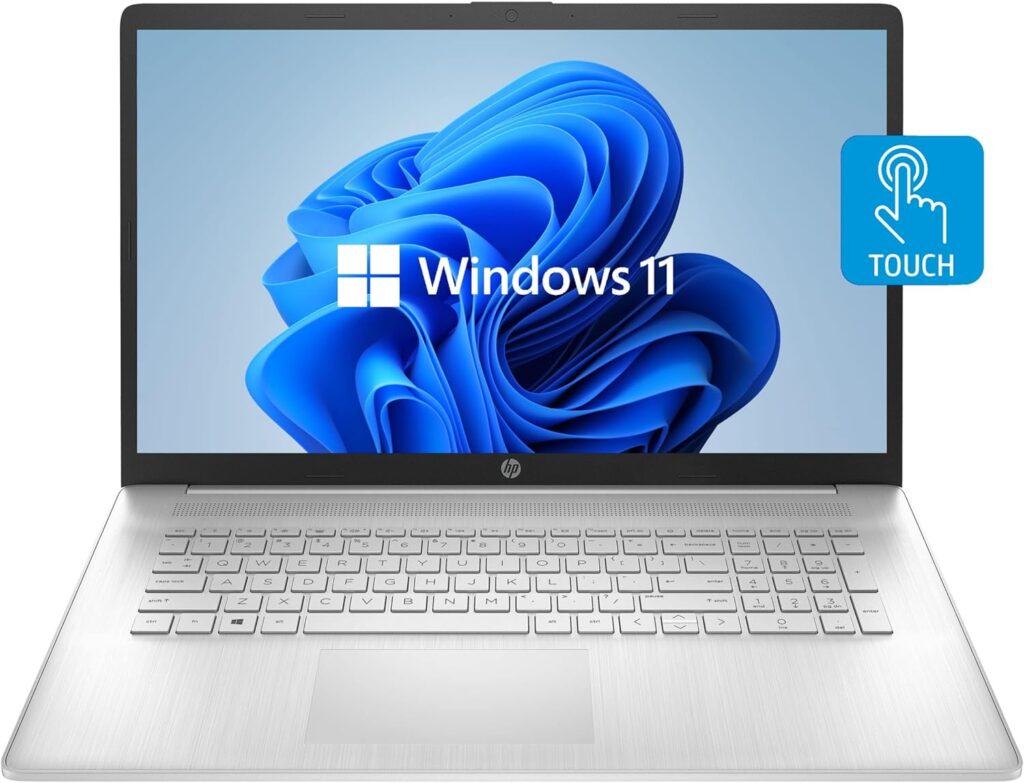
The HP Newest 17 Laptop Notebook offers various models and configurations, providing an excellent budget-friendly option for general use, featuring a vibrant display. The base model starts at $299.99 in the USA.
Specifications:
- Processor: AMD Ryzen 5 5625U CPU
- RAM: 4GB
- Storage: 128GB SSD
- Display: 17-inch
- Operating System: Windows 10
Pros:
- Good processing performance, powered by the AMD Ryzen 5 5625U CPU.
- The laptop boasts a sharp and colorful 17-inch display, enhancing multi-window productivity.
Cons:
- Limited port availability may inconvenience users who require multiple connections simultaneously.
- The laptop is heavy and may not be ideal for frequent travel due to its weight.
How does this laptop help professionals?
HP laptops help cybersecurity professionals protect digital assets and networks with their many features. HP laptops can perform vulnerability assessments, penetration testing, and forensic analysis due to their processing power and mobility. HP laptops let cybersecurity experts run resource-intensive security tools and simulations to find and fix system and network vulnerabilities with powerful processors and memory.
FAQs
1. Is 16GB RAM enough for cybersecurity?
A multi-core processor, such as an Intel i7 or i9, or an AMD Ryzen 7 or 9, is recommended for smooth performance. Memory (RAM): Adequate RAM is crucial for multitasking and running memory-intensive applications like virtual machines. A minimum of 16GB RAM is recommended, but 32GB is ideal for more advanced work.
2. What computer do you need for cybersecurity?
Intel Core i7 processors are a good choice in terms of power and capacity. AMD Ryzen series processors, however, are also good choices for selecting the best laptop for cybersecurity. GPU: Cybersecurity laptops must have powerful graphics cards and CPUs. Having a robust GPU allows for faster rendering of images.
3. Is an i5 processor suitable for cybersecurity?
Cybersecurity students frequently require the ability to run multiple virtual machines concurrently, necessitating a robust processor. The Intel Core i5 processor is commonly favored for its capability to efficiently manage demanding tasks in this context.
4. Which is preferable: Python or cybersecurity?
Python proves advantageous in cybersecurity as it facilitates numerous cybersecurity functions such as malware analysis, scanning, and penetration testing. Known for its user-friendly nature and elegant simplicity, Python emerges as the ideal language choice for many cybersecurity professionals.
5. Do I need a laptop to learn cyber security?
If you want to become a cybersecurity expert then you need to get the right laptop. A good cybersecurity laptop must have strong hardware. It needs to run important security programs. These programs use a lot of power from the computer.
Conclusion
Cybersecurity experts’ computers depend on numerous aspects. The best laptop for cyber security is a good value with reliable performance. Its efficient cooling system and strong processor make it ideal for data analysis, antivirus software operation, and system penetration testing.
Cybersecurity workers should balance performance, price, and task fit when choosing a laptop. Cybersecurity professionals might choose the Acer Predator Helios or other solutions based on their jobs and processes.








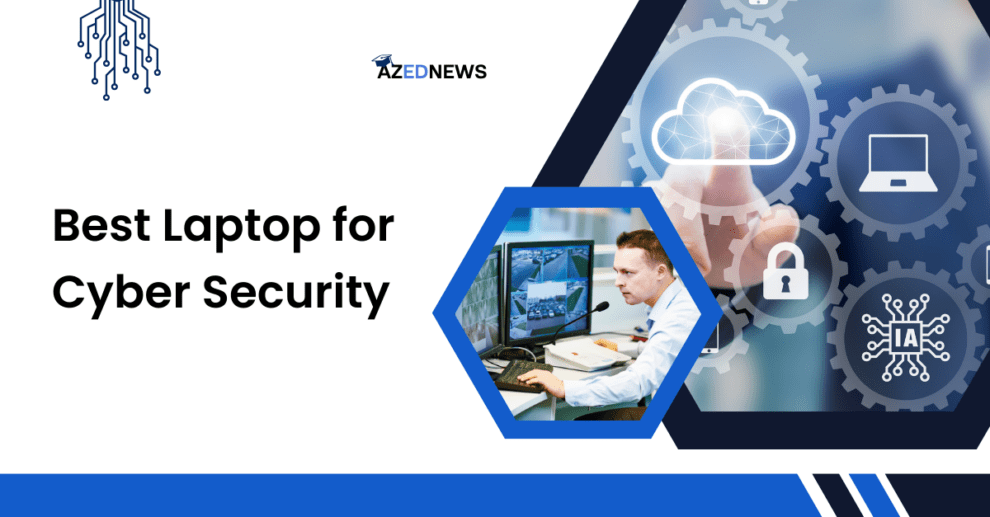



Add Comment